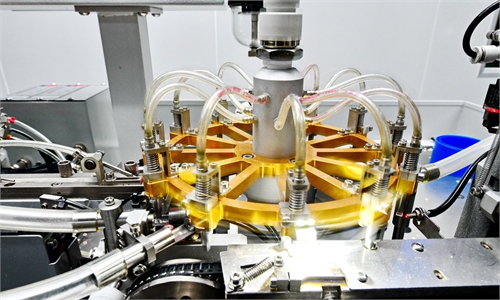
Photo:VCG
China has criticized US government's discriminatory subsidy policies and administrative measures, calling on the WTO to strengthen supervision of US practices that violate WTO rules during the regular meeting of the Committee on Subsidies and Countervailing Measures held in Geneva on Tuesday, China Media Group reported on Wednesday.
During the meeting, China pointed out that the Inflation Reduction Act introduced by the Biden administration in 2022 was a protectionist measure in the guise of "green development." In its specific implementation rules, the US arbitrarily interpreted "free trade agreements" and seriously undermined global trade rules.
US' semiconductor subsidy policy, together with its export control measures, have disrupted the global chip supply chain, reflecting the "Cold War thinking" of the US and "trade bullying" when it comes to normal trade, it said. US actions severely damaged the interests of the Chinese side and hurt the interests of all parties, including the US itself and its allies.
China called on the US to eliminate discriminatory and distorting subsidy measures that are not in line with WTO principles. The WTO should strengthen its supervision of US violations, and WTO members should work together to maintain the stability and resilience of the global semiconductor supply and value chains.
"China asserts its interest and rights through the platform of the WTO, which is what the country should and must do," Xiang Ligang, director-general of the Beijing-based Information Consumption Alliance, told the Global Times on Wednesday.
After the implementation of the CHIPS and Science Act, both its allies and the US itself suffered, Xiang said. South Korea, for instance, has run a trade deficit for 14 consecutive months, and its exports fell 14.2 percent year-on-year in April, data released by the country showed.
"The sharp decline of chip exports to China has become a problem that South Korea cannot ignore, which demonstrates that it has not yet found a market that can replace China," Xiang added.
Bloomberg reported on Wednesday that the US Semiconductor Industry Association said that American semiconductor companies want access to the Chinese market despite the US government citing national security concerns, and they require clear rules from the Biden administration.
"It's our biggest market and we're not the only industry that lays claim to that," said John Neuffer, the president and chief executive officer of the association. "Our view is that we need to play in that market."
"We just want there to be clear rules of the road so that what the government thinks is a national security concern is very well defined and transparent and also predictable," said Jimmy Goodrich, the vice president of global policy for the trade group. "We've kind of had over the last two administrations, frankly, a bit of a roller-coaster ride when it comes to national security and trade restrictions."
"For businesses in the semiconductor industry that are trying to plan for five years out, not knowing what might happen in the next six months creates a lot of uncertainty and challenges," Goodrich said.



